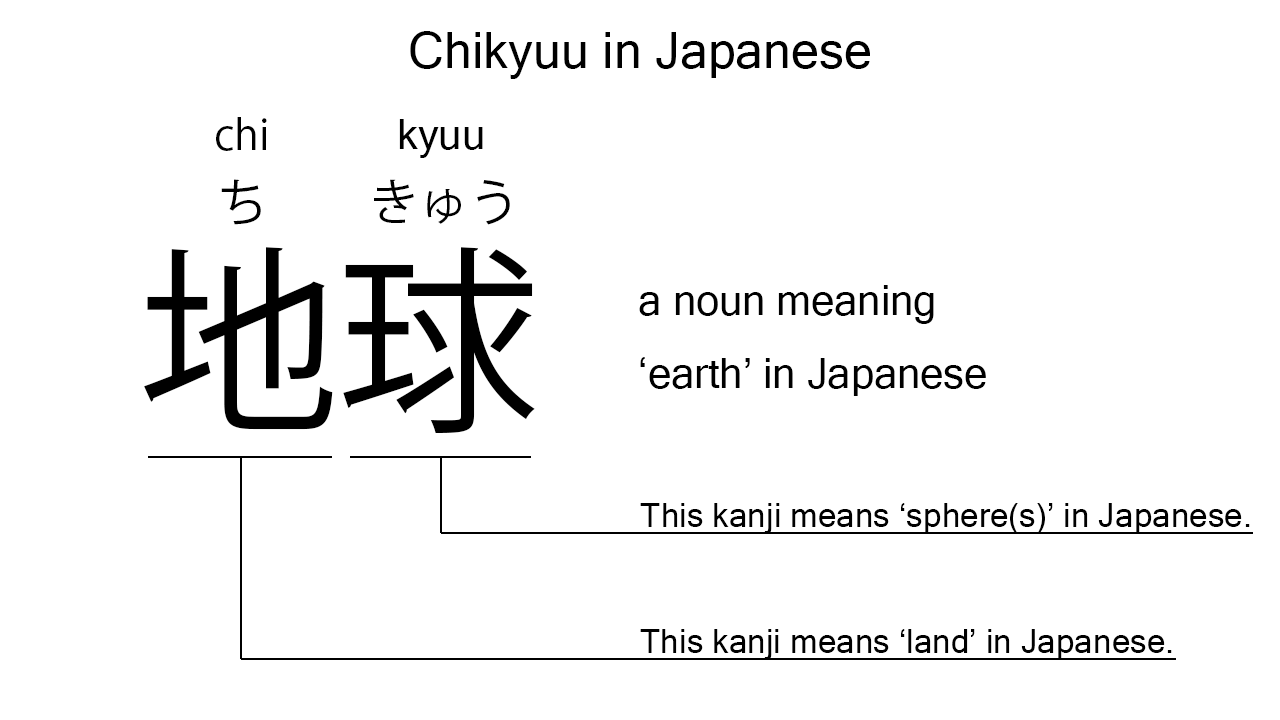How to say “earth” in Japanese
Native speakers say “chikyuu” to mean ‘earth’ in Japanese. Perhaps, some Japanese learners know this word as it is sometimes used in Japanese movies, songs, novels, manga, anime, and the like. In this blog post, however, I will explain this word in detail based on its kanji expression. And also, I will explain how to use it through example sentences. My explanations would help Japanese learners understand “chikyuu” more clearly. Then, let’s get started!
Contents
Definition and meaning of “chikyuu”
Let me start with the definition and meaning of “chikyuu”.
- chikyuu – 地球 (ちきゅう) : a noun meaning ‘earth’ in Japanese.
The definition and meaning are very simple and clear. To understand this noun more clearly, however, let me explain its kanji characters in detail, one by one.
Chikyuu in kanji
The kanji expression of “chikyuu” consists of the following two kanji characters:
- 地 : a kanji character often used to mean ‘land’, ‘ground’, or such in Japanese.
- 球 : a kanji character often used to mean ‘sphere’, ‘ball’, or ‘globe’ in Japanese.
These two kanji characters tell us that the formed noun literally means a ‘land sphere’ in Japanese. This literal interpretation is not completely in line with the actual meaning, but still very understandable. The Earth can be considered as a sphere made of soil. Only those who still believe that the Earth is flat cannot accept this kanji concept, I think.

When we meet new kanji expressions, we should check their kanji characters in detail to understand their meanings clearly and deeply. In many cases, kanji characters tell us a lot about the meanings of the expressions they form. Actually, here, we could get the better understanding of “chikyuu” through the detailed kanji check above.
So far, I’ve explained the definition and meaning of “chikyuu” together with its kanji characters. Then, let me explain how to use it through the example sentences below.
Example #1: how to say “earth” in Japanese
watashi wa chikyuu wa marui to omoi masu – 私は地球は丸いと思います (わたしはちきゅうはまるいとおもいます)
I think that the earth is round.
Below are the new words used in the example sentence.
- watashi – 私 (わたし) : a pronoun meaning ‘I’ in Japanese.
- wa – は : a binding particle working as a case marker or topic marker. In the example, this works after “watashi” to make the subject in the sentence.
- wa – は : the same as explained above. The second one works after “chikyuu” to make the subject in the clause.
- marui – 丸い (まるい) : an i-adjective meaning ’round’ or such in Japanese. In the example, this works as the complement in the clause to describe “chikyuu”.
- to – と : a case particle working as a quote marker. In the example, this works after the clause, “chikyuu wa marui”, to indicate what the speaker thinks.
- omoi – 思い (おもい) : one conjugation of the verb, “omou”, which means ‘to think’ in Japanese. In the example, it has been conjugated for the batter connection with its following word.
- masu – ます : an auxiliary verb used after a verb to make it polite. Probably, this is well known as a part of Japanese masu form. In the example, this is used after “omoi” to make it sound polite.
This is a typical usage of “chikyuu”. When we want to refer to the earth in Japanese, this noun is always a very good option.
Example #2: another usage of “chikyuu”
iie, watashi tachi wa chikyuu wa tairada to omoi masu – いいえ、私達は地球は平らだと思います (いいえ、わたしたちはちきゅうはたいらだとおもいます)
No, we think that the earth is flat.
Below are the new words used in the example sentence.
- iie – いいえ : can be used as an answer to say “no” to a question.
- tachi – 達 (たち) : a suffix used after a noun or pronoun to make its plural form. In the example, this is used after “watashi” to make its plural form, “watashi tachi”, which means ‘we’ in Japanese. Learn more about Japanese plural.
- tairada – 平らだ (たいらだ) : one conjugation of the na-adjective, “tairana”, which means ‘flat’ in Japanese.
This is another typical usage of “chikyuu”. In this example, it works as a part of the phrase, “chikyuu wa tairada”, which means ‘the earth is flat’ in Japanese. Those who still believe that the earth is flat can use this phrase conveniently, I think.
Summary
In this blog post, I’ve explained the definition and meaning of “chikyuu” in detail based on its kanji expression. And also, I’ve explained how to use it through the example sentences. Let me summarize them as follows.
- chikyuu – 地球 (ちきゅう) : a noun meaning ‘earth’ in Japanese. These two kanji characters literally mean a ‘land sphere’ in Japanese. This literal interpretation is not completely in line with the actual meaning, but still very understandable. The Earth can be considered as a sphere made of soil. Only those who still believe that the Earth is flat cannot accept this kanji concept, I think.
Hope my explanations are understandable and helpful for Japanese learners.